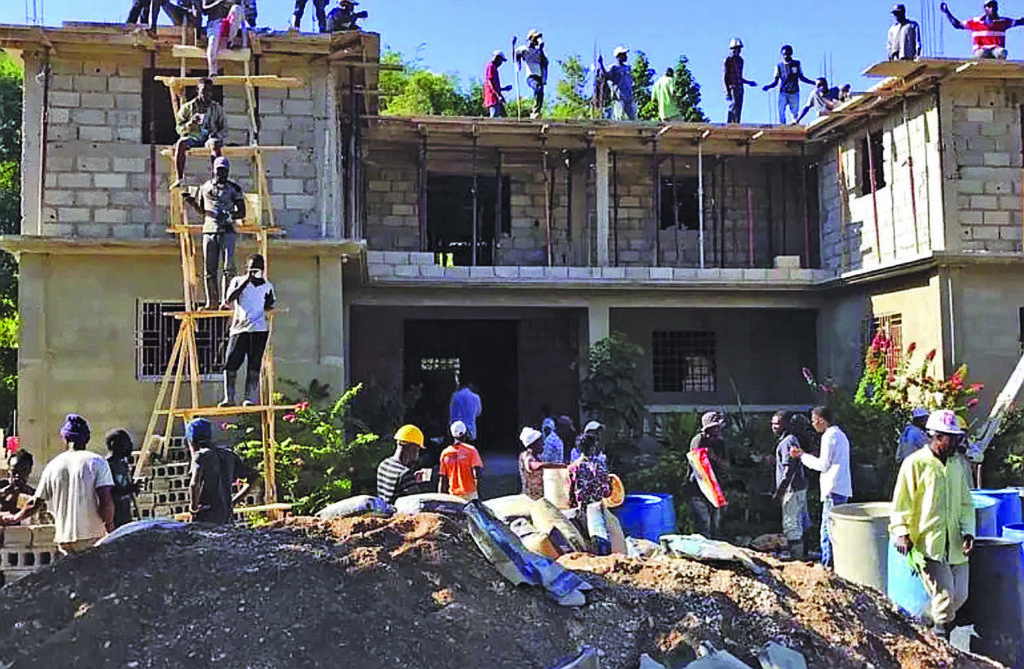
Haitian volunteers worked with United Hearts volunteers from Fargo-Moorhead to build the trade and vocational school.
The future of Haiti looked dark when Paul Aladin and his family fled its political turmoil 29 years ago. Conflict roiled the Caribbean nation — political violence adding desperation to the poverty that already beset the their homeland.
Since then, Haitians have suffered even greater sorrows, including the 7.0 earthquake that devastated the southwest part of the island in 2010 and the even stronger disaster that shook it in 2021.
Yet there is hope, says the pastor of Bridgepoint Community Church in Moorhead … thanks to faith, love and the energy of the area volunteers whom he has brought together in United Hearts for Haiti. The FM-based nonprofit, incorporated in 2008, has brought a variety of blessings to the impoverished area. The crown jewel of its mission, so far, is establishment of the Train and Sustain Trade School, offering vocational training to help men and women support their families and build better lives in their home country. Among its offerings are training courses in first aid, sewing, baking, welding, construction and computer operation.
“There is changing momentum there,” he says of the city of Cavaillon, a town of about 56,000 southwest of Port au Prince where he and his Fargo-Moorhead volunteers have been working to bring hope for nearly 15 years. “It shows that love, kindness and compassion can do better than anything. We are showing that something can be done.”
After a career in manufacturing and construction in 16 states across the U.S., Aladin has refocused his considerable on finding ways to change lives in his native land. The seed was planted, he says, while he was working with GEM — Global Electric Motorcars — the groundbreaking Fargo-based manufacturer of personal electric vehicles that was ultimately sold to Chrysler.
He was drawn to the church work, he says, in the early 2000s. “I began to take it very seriously, making presentations to churches and then interning,” he recounts. In 2009 he was ordained as a minister in the Church of the Nazarene. At about the same time, the then-struggling church in Moorhead, which dated back to 1960, was contemplating closing its doors. Instead, Aladin was recruited as its pastor. “When I came over from Fargo, there were not too many people. The goal was to revive and grow it,” he says.
Now Bridgepoint is the center of an active multicultural congregation. Among them are some of the 100 or so Haitian-Americans now living in Fargo as well as those with African, Mexican, Indigenous and Caucasian roots.
Its members have been involved in supporting United Hearts for Haiti through fund-raising and other projects. Much of the international organization’s support, however, comes from beyond the church walls, including other church groups from Fargo-Moorhead and the tri-state area as well as businesses and individuals committed to Aladin’s mission.
He started with vocational education for teens and adults, he says, after talking with Cavaillon residents. “I asked,’What would you like to see?’” he says. “They told me, ‘We need to train our young men and women for productive futures so they do not go into gangs.’” He adds, “If my own family had not seen that I got an education, I might have gone that way myself — or might be dead.”
For more than a decade, he organized two or three mission trips a year, recruiting skilled local volunteers who could spend one or two weeks teaching not only Haitian students, but their teachers. Doctors and nurses have taken part in medical missions, instructing Haitians in first aid and home health care in a setting altogether different than the familiar ways of the U.S. Tradesmen and -women have taught hands-on skills to aid not only in making a living, but building the infrastructure of the Haitian area. Farmers have shown how to grow nutritious crops.
When a major earthquake devastated the area in 2010, United Hearts for Haiti helped gather food and supplies and shelter those who were left homeless. The group did it again just 18 months ago when another quake, compounded by a hurricane, left thousands homeless. By then, they could offer not only supplies but shelter in the two-story facility that had been built with the help of a burgeoning number of Cavaillon volunteers. That building now houses the vocational school, which began offering formal classes in September.
Aladin is always on the hunt for helping hands for the Haitian community. He’s recruiting educators for three missions in the coming year, resuming the pace that had been disrupted for several years by the pandemic. “It is a life-changing experience,” he promises. Nurses, for example, learn much that’s never taught in American universities: “The practice, the people — their ministrations are entirely different there. These are things you cannot learn in school. Seeing them will change your life.”
United Hearts for Haiti is also looking for equipment for its vocational setting — “welding machines, commercial baking ovens, sewing machines,” he details. Donated funds are needed as well. He estimates the cost of a year of training at $200 or so for each of 400 students; sponsors are welcome.
“Seeing these people and extending a hand to help will change your heart,” he promises. “When people give, they come to understand the great things we can accomplish together.
“Haiti is a country still in disarray. Big organizations have put so much money there, but the needs still remain. What can a much smaller organization like United Hearts for Haiti accomplish?” He pauses. “When you love what you do, and do it in love, it will always make a difference. The tide is turning. Our ministry is simple. We do everything we can do to help people make better lives.”
For more information, go to www.unitedheartsforhaiti.com, or contact Aladin by phone or text at 701-540-1383; or email paladin41@q.com.


